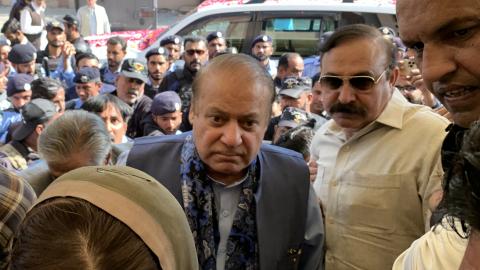Soon after Nawaz Sharif was convicted by an Accountability Court in July 2000, during the regime of General Pervez Musharraf, I wrote in a column that “In a country where successive regimes have pursued mistaken policies and wrongs have been committed on a wide scale, the most logical course of action is to try to bury the past.” The suggestion was aimed at finding a way to move on, not to forget history.
I warned that without reconciliation, inclusion, and acknowledgment of past mistakes, it was “unlikely that Pakistan will be able to function as a politically normal country any time soon.” Nawaz Sharif faced trial at the time inside the Attock Fort. My warning 23 years ago has been borne out by events since then. Now that another trial in prison, and the likely conviction, of a former prime minister looms, let me repeat that warning.
Most of the young Pakistanis who have been brought up to hate conventional politicians have no recollection of past repression and injustices. They are angry only over what they perceive to be the mistreatment of their favourite leader. The key to changing Pakistan’s trajectory, however, lies in understanding, acknowledging, and learning from Pakistan’s difficult and tragic history.
Calls to ‘change the system’ are not new to Pakistan, as most Pakistanis tend to demand radical solutions and revolutionary change. But it is important to remember that the nation has attempted complete overhauls several times since 1958. After each ‘change’ things have remained more or less the same. Corruption, inefficiency and disregard for the law has varied in degrees but has never disappeared. Perhaps it is time for us to take stock of why, despite the yearning for revolution, Pakistanis cannot change their lives.
If the experience of other nations is any guide, changes in society and forms of government result from an evolutionary process. Evolution requires patience. It also demands acceptance of the past as an integral part of the present. Thus, every successful country has built its political system in stages. At every stage, the gains of the past were carried forward to the future and mistakes were treated as lessons. There was no denial of history. Even sordid chapters and unhappy events were duly acknowledged.
Almost every nation currently marching along the road of success and prosperity accepts its past and builds its future upon that past. In Pakistan, however, there is a tendency to deny the past. Every change of government is described as a revolution and every ruler spends a great deal of time and energy denying that anything good ever happened before him. Moreover, supporters of every ‘revolutionary’ leader also buy in into the narrative that their leader represents good (‘Haqq’) and his or her opponents are nothing but evil (‘baatil.’)
But politics is a process, not a one-time event, and the Haqq versus Baatil paradigm does not help modern nations evolve. In the United States every president, whatever his faults or accomplishments, is remembered officially. France honours all its past leaders though some of them had many failings. India builds a memorial to every dead prime minister. Rajiv Gandhi received the honour even though the investigation relating to the Bofors deal during his period in power continued.
Egypt gives due respect to Jamal Abdel Nasser and Anwar Sadat despite having left the political legacy of one and the economic policies of the other far behind. Arab monarchies do not delegitimize past rulers to honour current ones. There is a great advantage in seeing the past as the starting point of the future. But Pakistan’s fascination with revolution, with ‘hanging 5000 people and starting afresh’ as some people describe it, creates upheaval every few years, without any long-term gain.
For Pakistanis, the past is just a dirty secret that should be confined to a closet. We do not like talking about the good and the bad of Ghulam Muhammad, Iskander Mirza, and Yahya Khan. Similarly, Ayub Khan, Zulfikar Ali Bhutto, and Ziaul Haq receive little mention except from their family members (who only praise them) despite having presided over our destiny for long periods of time. Each one of Pakistan’s recent rulers has ended up being hauled in courts of law by their rivals.
It is fashionable to say that Pakistan has been ruined by its ‘leadership crisis’. In reality, Pakistan has had nothing but a perpetual ‘tolerance crisis’. Pakistanis tend not to tolerate the alternative point of view nor is there a desire to recognize even the right of existence of opponents. All those who gain support by calling their predecessors ‘crooks and looters’ continue their projects and policies. But they do not have the moral courage to admit that continuity is an essential feature of governance.
The Pakistani culture of governance (if it can be called that) revolves around absolute power. It requires creation of the illusion of change even in areas where change is neither desirable nor possible. Pakistan needs effective constitutional checks and balances. Its political parties need to start electing their officials and practising intra-party democracy.
Pakistan’s judiciary needs to get out of seeking media attention and praise through political meddling. The independence of the civil services needs to be guaranteed alongside an end of the civil-military imbalance. But all that can be achieved only through dialogue and compromise, not through threats of revolution or unleashing of angry supporters.
Nothing will be gained by constantly trying to re-invent the political wheel. Far too many times, everything has been put on hold to erase the political existence of a predecessor. That must stop if a functioning political system is to emerge. Instead of denying and erasing the past, Pakistan would be better served if the past is accepted, and the future is built in light of lessons learned from it.



















